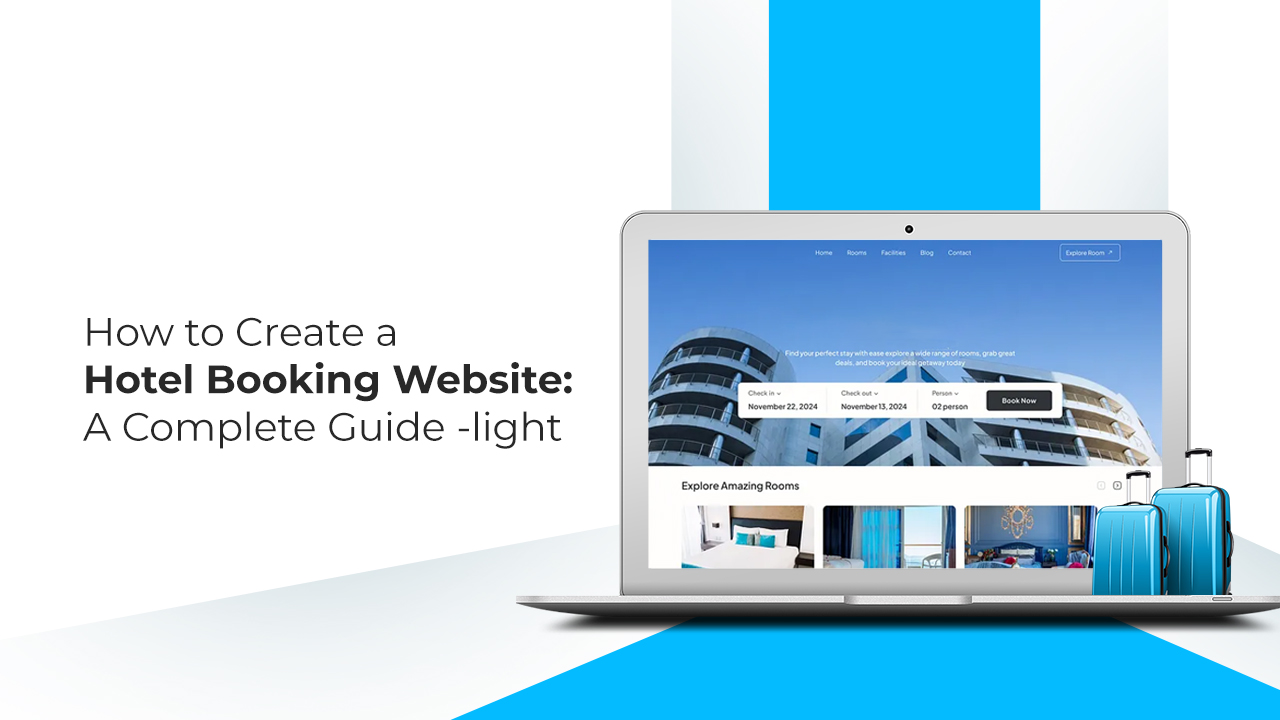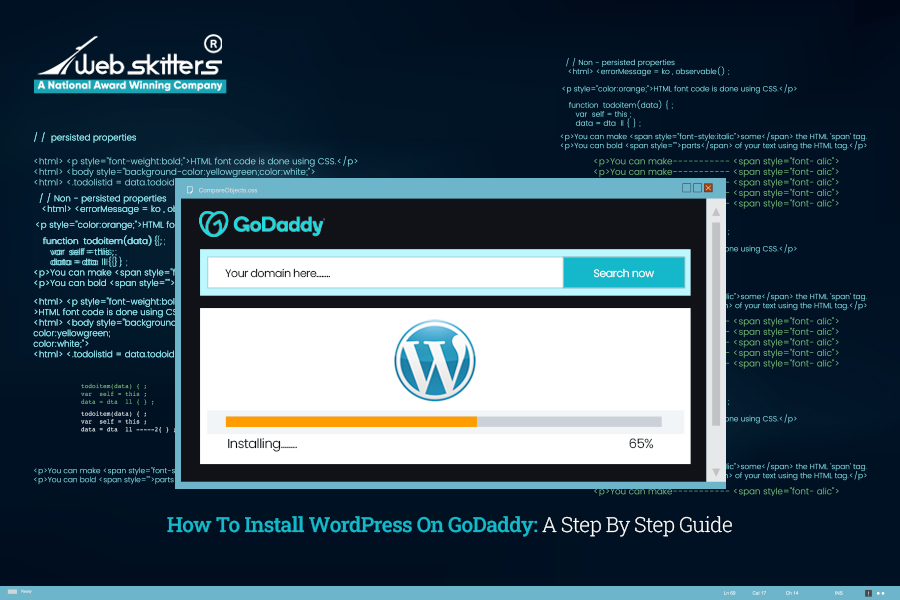As a business owner, you only have 8.25 seconds to impress your audience with a web presence. Do not believe us? Well, you can always look.
Let us assume you have a digital hotel booking platform. Going digital is already a winning streak. Owing to the present market, most users rely on digital platforms when booking their stays. It is easy and convenient, and one can explore numerous options in a location.
However, what do you think the average user looks at stumbling upon a hotel booking website? – The design.
So, with 8.25 seconds in hand, your hotel booking website design is the ultimate conversion element of your presence. It must be immaculate to attract and engage traffic and convince users to convert.
This comprehensive read will discuss how to plan a user-friendly hotel website design from scratch to ensure better conversions. Let us begin with the basics.
Understanding the Basics of Hotel Booking Website Design
A fundamental hotel booking website allows users to book rooms online through an integrated reservation system. Guests choose the type, number of rooms, specific dates, and headcount.
A hotel booking website may be used by a single hotel or a chain of hotels to receive bookings. The hotel booking engine integration allows guests to optimize through various selections. It entails browsing room types, selecting arrival and departure, exploring amenities, and more.
Each hotel book engine comprises a property management system (PMS) and offers users real-time room availability information.
The primary purpose of a hotel booking website is to ensure users and hotel owners have a streamlined room allotment system. A feature-rich hotel booking website makes traveling convenient. The efficient booking attracts more users, leading to better leads and conversion.
However, as a business owner, you must remember that several hotel booking websites and applications are available. The prime ingredient in standing out is to ensure the online hotel reservation system is user-focused and offers smooth functionality.
What Features should a Hotel Booking Website have?
The perfect features are a must-have to ensure a hotel booking website gains the ideal traction. However, website planning can seem daunting if you are new to the hotel reservation business.
In this section, let us discuss some user-friendly hotel website features to ensure more traffic and conversions –
A user-friendly interface
Every hotel booking engine must have a user-friendly interface that is accessible to users with varied experiences. The user must be able to effortlessly navigate through the pages and features.
The website or application must be fast-loading, glitch-free, and easy to understand. A complicated website interface will distract users and lead to increased abandonment.
User-friendliness is a mandatory aspect of any web presence. It must be prioritized at the early stages of the hotel website development.
Easy Booking Process
Accessibility and effortless booking are primary for users who opt for hotel booking software. Anyone can handle an ideal web presence, irrespective of their tech expertise.
The booking process, for instance, must have minimal steps with proper guidance. Several professional web developers offer position tracking, which allows users to comprehend their position in the booking cycle. It minimizes the overwhelming aspect of booking a stay.
Furthermore, some websites allow the auto-saving of personal information to reduce redundancy in the booking process and save time.
Mobile-Friendly
As a business aiming for growth and enhanced conversion, mobile-friendliness is essential. It ensures that a website offers similar visual and functional capabilities, even on mobile devices.
In this mobile-leading era, prioritizing mobile-friendliness assures better sales, broader audience reach, and increased conversions.
Additionally, offering an effective web presence irrespective of devices leads to increased returning customers and word-of-mouth marketing.
Language and Currency Support
When you have a digital business idea, like a hotel booking website, in mind, ensure you think globally. The presence must cater to users worldwide.
Language plays a vital role in web engagement. Offering users the option to choose a preferred language and book the hotel elevates satisfaction and user experience.
The effect is similar when users are offered multiple currency options.
Language and currency supports helps businesses expand their reach globally and cater to a broader audience base.
Efficient and Secure Payment Gateway
Apart from multiple currency options, a secure payment gateway plays a significant role in ensuring credibility. Since user data is involved, it must be integrated efficaciously.
Offering options in a gateway adds to the user experience. For instance, users must be able to convert with credit, debit, or pay later options.
Gallery
As a hotel booking engine, ensure your target users have access to all hotel room information. This includes amenities, room views from all angles, and specific details like wheelchair access or pet-friendly.
These are necessary pieces of information that help customers make an informed decision. Furthermore, provide clean and crisp images of the property, including outdoors, washrooms, bedding, and more. It contributes to customer trust and promotes conversion.
Review Section
If you are launching the website for the first time, this can be cumbersome. Reviews are the ideal method to inform your upcoming customers about the services and quality of the system. The testimonials and images offered by previous customers contribute to a positive experience and make the hotel booking website a credible platform.
Remember that hotel booking engines vary based on the business type. For instance, some hotel booking websites are designed to book a specific brand or chain, while other platforms allow you to book any hotel in any location.
Therefore, the features depend on the business type. We advise you to consult a professional hotel website development team to address your needs and preferences.
Furthermore, there is no ideal answer to how to design a user-friendly hotel booking website. It governs around the users, their needs, and expectations from the hotel booking platform. Conducting thorough market research to understand the target audience and other businesses with a similar niche for better insights is vital.
Steps to Create a Hotel Booking Website from Scratch
Building a hotel booking website demands experienced hands, especially when the goal is effective engagement and conversion. Creating the ideal platform and guiding users with the perfect features can be rewarding.
Let us delve into this comprehensive section of developing a functional and user-friendly hotel booking website –
1.Define Your Goals and Target Audience
Before getting into the technical aspects, it is crucial to establish a clear vision for your hotel booking website. Identify the target audience, their preferences, and their needs. It will help you tailor the website’s features and content accordingly. Additionally, a structured website ensures every customer’s requirements are prioritized.
2.Choose the Right Technology Stack
The technology stack you select will form the backbone of your hotel booking website. Consider factors such as scalability, maintainability, and cost-effectiveness. Popular options include –
Programming languages: HTML, CSS, JavaScript
•Frameworks: React, Angular, Vue.js
•Content management systems (CMS): WordPress, Drupal, Joomla
•Booking engines: Booking.com, Expedia, TripAdvisor
•Payment gateways: PayPal, Stripe, Authorize.Net
•Database management systems: MySQL, PostgreSQL
Each has its strengths and is utilized for a unique development cycle. We advise consulting with a web development company and making an informed decision based on growth and objectives.
3.Design the User Interface (UI)
A visually appealing and intuitive UI is essential for attracting and retaining users. Pay attention to the following aspects of the hotel booking website –
• Layout and navigation: Ensure a clear and logical structure that guides users through the booking process. It must be simple, free from jargon, and with smooth navigability.
• Color scheme and typography: Choose colors and fonts that complement your brand and enhance readability. The visual presence must be inclusive and designed for varied users.
• Responsive design: Optimize your website for various screen sizes to provide a seamless user experience across devices. Whether hotels are booked through mobile devices or tablets, the experience must be smooth – that is the standard.
4.Develop the Website’s Core Functionality
While visual appeal grabs users’ immediate attention, functionality ensures website engagement and retention. A structured presence with smooth booking functions ensures better conversions and return on investment.
The core functionality of a hotel booking website includes –
• Search and filter options: Allow users to search for hotels based on location, dates, price, amenities, and other criteria. It contributes to the user-focused attempt, and audiences keep coming back.
• Booking process: Create a straightforward booking flow that collects essential information from users, such as guest details, payment information, and room preferences. Avoid creating a lengthy process and ensure users know their position during the booking process.
• Payment integration: Implement secure payment gateways to process transactions smoothly. Data security is optimum, especially when payment gateways are involved. Focus on offering data protection to facilitate business credibility.
• Confirmation and cancellation: Send automated confirmation emails to guests and provide a clear cancellation policy. Additionally, when customers cancel, be prompt to offer refund details and keep them posted.
5.Integrate a Booking Engine
Consider integrating a third-party booking engine to streamline the booking process and manage inventory. It helps minimize manual labor, and businesses can concentrate on other operations. The third-party engines provide additional features such as rate management, channel distribution, and customer relationship management (CRM).
6.Optimize for Search Engines (SEO)
Implementing SEO best practices is vital to improve a website’s visibility in search engine results. It translates to more organic traffic, better revenue, and business growth. Here are the fundamental steps to website optimization –
• Keyword research: Identify relevant keywords and incorporate them naturally into your website’s content. Website content, blogs, service pages, FAQs, and more may vary.
• On-page optimization: Optimize the website’s title tags, Meta descriptions, header tags, and image alt text. Here, too, you must incorporate the keywords naturally for elevated visibility.
• Off-page optimization: This process entails acquiring high-quality backlinks from reputable websites to enhance the authority of the hotel booking website.
7.Test and Launch
Thoroughly test your hotel booking website on different devices and browsers to ensure it functions as expected. The visual structures must be premium and the functionality smooth. Address any bugs or issues before deployment. Several web development companies utilize beta modes to understand glitches, if any.
Once satisfied with the performance, launch your website and promote it through various marketing channels.
8.Monitor and Maintain
Continuously monitor the website’s performance and user feedback. Make necessary updates and improvements to keep it relevant and engaging. Following hotel website trends and best practices is critical to maintain a competitive edge.
To maintain a positive user experience, regularly update your content, optimize for search engines, and address security vulnerabilities.
Remember to focus on providing a user-friendly experience and keep track of feedback and testimonials to understand consumer expectations.
Types of Hotel Booking Software
There is a one-size-fits-all approach to finding the best hotel booking software for small hotels. It comes down to features and convenience, as well as scalability.
Here are a few options to consider –
- Property Management Systems (PMS): They offer comprehensive solutions and handle various aspects of hotel management, including reservations, front desk operations, housekeeping, and accounting. They are ideal for larger hotels with complex operations aiming to streamline the workflow and improve operational aspects.
- Online Travel Agent (OTA) Integration: OTAs like Booking.com, Expedia, and TripAdvisor offer booking platforms that can be integrated into your hotel’s website. They are an example of third-party booking engines and contribute to a broader customer reach.
- Cloud-Based Booking Solutions: Software-as-a-service (SaaS) platforms provide flexibility and scalability. They can be accessed from anywhere with an internet connection, reducing the upfront cost of developing an app.
- Custom-Built Software: It is ideal for hotels with unique requirements and can be tailored to consumer needs. While the development costs are high, a custom presence effectively addresses unique challenges and leads to enhanced ROI.
Whichever type of hotel management software you choose, here is a list of minimal but essential features to keep in mind –
- Reservation management: Efficiently handles bookings, cancellations, and modifications.
- Rate management: Flexible pricing strategies display dynamic pricing and seasonal rates.
- Channel management: Integrated with various OTAs and distribution channels for enhanced promotion.
- Front desk operations: Manages check-in/check-out processes, guest information, and payment.
- Housekeeping management: Performs task assignment, room status tracking, and maintenance scheduling.
- Reporting and analytics: Offers comprehensive data analysis for performance tracking and decision-making.
- Integration with other systems: Compatibility with accounting software, point-of-sale systems, and other hotel technologies for better conversions
How do you integrate a booking system into a hotel website?
Booking system integration allows potential guests to check room availability, select their preferred dates, and make reservations online effectively. Once well-integrated, it significantly enhances the hotel booking process and streamlines operations.
However, the first step is selecting an ideal online hotel reservation system. It must align with your business needs and contribute to growth.
Here is how to choose the perfect booking system before integration –
- Look for a system that offers features like real-time availability, payment gateways, guest management, and customizable templates.
- Ensure the system can accommodate your hotel’s growth and handle increasing bookings.
- Check if the system can be easily integrated with the existing website and property management software.
- Compare pricing plans and fees to find a system that fits your budget.
There are primarily two methods to integrate a booking system into your hotel website –
1. Direct Integration: This option involves embedding the booking system’s code directly into the website’s HTML. It is flexible; however, it demands technical expertise.
2. API Integration: An API (Application Programming Interface) bridges your website and the booking system. It is easier to implement and often provides more features.
You must hire a professional website development company to integrate a hotel booking system into the website effectively. They will perform the following steps –
- You must sign up with the selected booking system provider and input the property details, which include hotel information, name, address, room types, and amenities offered.
- Implement the pricing structure and update the real-time room availability to ensure users are offered relevant information.
- Regardless of the business size, a hotel booking website can be tailored. You can customize the appearance and functionalities with professional help.
- The booking system provider will offer a code snippet inserted into your website’s HTML.
- The website must be thoroughly tested to ensure it performs correctly and whether issues need addressing.
Always test for mobile friendliness and responsiveness to ensure users can effortlessly access and reserve their stays across devices. Pay attention to the notification process. Automated notifications about bookings, confirmations, and cancellations add to the positive user experience.
Best Practices for Hotel Booking Website Design
A well-designed hotel booking website significantly impacts your business’s success. Here are some hotel website design tips and best practices to create a user-friendly and visually appealing experience that drives bookings –
- Intuitive Navigation: Make it easy for visitors to find what they need. Use clear labels, logical menus, and a search bar.
- Fast Load Pages: Optimize your website’s speed to ensure a smooth user experience, especially on mobile devices.
- Mobile Responsiveness: Design your website to adapt seamlessly to various screen sizes since significant bookings happen on mobile devices.
- Clear Call-to-Actions (CTAs): Use prominent CTAs to guide visitors toward the sales funnel. Make them visually appealing and easy to find.
- Professional Imagery: High-quality photos of your hotel, rooms, and amenities can create a promising first impression.
- Consistent Branding: Maintain a consistent brand identity throughout your website, from colors and fonts to imagery and messaging.
- Whitespace: Use whitespace effectively to create a clean and uncluttered layout.
- Parallax Scrolling: Consider using parallax for a more engaging and immersive experience.
- Simple Booking Form: The booking form should be concise and easy to fill out. Avoid unnecessary fields and provide clear instructions.
- Real-Time Availability: Ensure the room availability is updated in real-time to prevent guests from booking unavailable rooms.
- Secure Payment Processing: Use trusted payment gateways to protect customer data and instill confidence in your website.
- Flexible Payment Options: Offer multiple payment options, including credit cards, PayPal, and mobile wallets.
- Informative Content: Create blog posts, articles, and guides that provide valuable information to potential guests.
- SEO Optimization: Optimize your website’s content for search engines to improve visibility and attract organic traffic.
- Social Media Integration: Use social media to connect with potential guests, share updates, and drive traffic to your website.
- Customer Reviews: Display positive customer reviews to build trust and credibility.
- Accessibility Features: Comply with accessibility standards like WCAG to ensure your website is accessible to people with disabilities.
- Alternative Text for Images: Provide descriptive alternative text for images to assist visually impaired users.
- Keyboard Navigation: Make sure your website is navigable using a keyboard for users who cannot use a mouse.
- Track Performance: Use website analytics tools to monitor key metrics like traffic, bounce rate, and conversions.
- A/B Testing: Experiment with multiple design elements and content to identify what works best for your audience. Keep room for enhancements.
- User Testing: Conduct user testing to gather feedback on your website’s usability and make necessary improvements.
Remember, a well-designed website is crucial for attracting and retaining customers in today’s competitive market.
How to Create a Responsive Hotel Booking Website?
In this digitally advanced era, maximum online activities occur on mobile devices. A responsive hotel website is mandatory for a seamless user experience across all screen sizes, from desktops to smartphones.
With a few simple responsiveness measures, you can reach a broader audience and increase your chances of securing bookings.
Why does a responsive, mobile-friendly hotel website matter?
Responsive websites offer a positive user experience, and the reasons are simple. The websites load faster and are easier to navigate on mobile devices, leading to higher engagement rates.
These have higher conversion rates, and users are more likely to complete a booking on an optimized website.
Google and other search engines prioritize mobile-friendly websites in their search results. It offers a competitive advantage in visibility.
Tips for Creating a Responsive Hotel Booking Website
Here are a few proven strategies to ensure a responsive hotel booking web presence –
- Use a Responsive Framework: Frameworks like Bootstrap or Foundation provide pre-built components and styles that adapt to different screen sizes. With a responsive framework, you can create a responsive and seamless design.
- Flexible Layouts: Design your website with flexible layouts that adjust to various screen widths. Use fluid grids and responsive images to ensure your content displays correctly on all devices.
- Touch-Friendly Elements: Make sure your website’s buttons, links, and other interactive elements are large enough and easy to tap on mobile devices.
- Optimize Images: Compress images to reduce file size and improve loading times on mobile devices. Use responsive images to display different versions of the same image based on the screen size.
- Test Across Devices: Test your website on various devices and screen sizes to identify any issues and make necessary adjustments.
Consider implementing features specifically designed for mobile users, such as location-based search, one-tap booking, and mobile payment options. Also, optimize mobile device content with shorter paragraphs and more concise language.
How to Optimize a Hotel Booking Website For SEO?
Search Engine Optimization is crucial for increasing your hotel’s online visibility and attracting potential guests. The steps are simple and effectively lead to increased traffic and conversion –
- Identify relevant keywords that potential guests are likely to search for, like hotels near [your location] or luxury hotels [your city].
- Incorporate your target keywords naturally throughout your website’s content and provide value to potential guests through blog posts, articles, guides, and destination information.
- Optimize the website for local search by including your hotel’s address, phone number, and other location-specific information.
- Use clean and descriptive URLs that include relevant keywords. Additionally, create an XML sitemap to help search engines understand your website’s structure and content.
- Create local citations by listing your hotel’s information on business directories and review websites.
- Use social media to share your content and engage with potential guests.
Use website analytics tools to track your website’s performance, monitor key metrics, and identify areas for improvement. Always be open to altering SEO strategies for different outcomes and growth.
How to Ensure Secure Transactions on a Hotel Booking Website?
A secure booking system is the cornerstone quality of a premium hotel booking website. It must efficaciously protect your hotel’s reputation, customer data, and financial transactions.
Here are some vital points to keep in mind when developing a hotel booking website –
A secure booking system protects sensitive customer data, such as credit card information, personal details, and booking history. Data breaches can have severe consequences, including financial losses, reputational damage, and legal liabilities. Here are the most viable measures –
- Use a Secure Sockets Layer (SSL) certificate to encrypt data transmitted between your website and the customer’s browser. It ensures sensitive information is protected from unauthorized access.
- Choose a reputable payment gateway that adheres to industry standards like PCI DSS. It offers robust security measures to protect cardholder data.
- Conduct regular security audits to identify and address potential vulnerabilities in your booking system.
- Implement firm password policies for the booking system and customer accounts. Encourage users to create complex passwords and avoid sharing them.
- Regularly back up your booking system data to protect against data loss due to hardware failures, software issues, or cyberattacks.
Prioritizing security and reliability leads to a trustworthy and efficient booking experience and contributes to business success.
Tips for Maintaining and Updating a Hotel Booking Website
Regularly reviewing and updating your website ensures it remains relevant, functional, and secure. Since the digital realm is constantly evolving and making for further innovations, it is vital to look into improvements and stay competitive with features.
- Consistently update and inform your content through blog posts, articles, or special offers. This improves search engine rankings and attracts more visitors.
- Update your website’s images to showcase your hotel’s latest features, amenities, and events. High-quality visuals can enhance your website’s appeal.
- Ensure your booking engine is updated with the latest features and security patches. Regular updates can help prevent vulnerabilities and improve guests’ booking experience.
- Gather feedback from your guests and use it to identify areas for improvement. Make necessary changes to enhance your website’s user-friendliness.
- Keep your website’s software and plugins updated to protect against security threats and ensure optimal performance.
- Monitor loading speed and ensure your website is fully responsive to provide a seamless experience on all devices, including smartphones and tablets.
- Track conversions like bookings and inquiries to measure the effectiveness of your website and marketing efforts.
Enhancing User Experience and Customer Support
Whether you are new to the digital sphere or updating the hotel booking website for growth, a positive user experience is the game changer.
Therefore, by focusing on the hotel website user experience and providing excellent customer support, you can create a memorable and satisfying experience for your guests.
Keep these pointers handy when working with the hotel website design professionals –
- Make your website easy to navigate with clear menus, search functionality, and well-organized content.
- Ensure your website is fully responsive and optimized for mobile devices, as maximum bookings are made on smartphones and tablets.
- Use prominent and visually appealing call-to-actions (CTAs) to guide users towards booking.
- Consider personalization features to recommend relevant offers, packages, or amenities based on user preferences or past behavior.
- Offer multiple channels for customer support, such as phone, email, live chat, and social media. Also, provide customer support around the clock to address inquiries and issues promptly.
- Respond to all reviews, positive and negative, promptly and professionally. Show that you value customer feedback and are committed to improving your services.
- Use customer feedback to identify areas for improvement and make necessary changes to enhance your website and services.
Creating the Best Hotel Booking Website for 2025
We hope we have provided you with the necessary information on how to create a user-friendly hotel booking website.
The idea is to prioritize the users for an immaculate visual and functional presence. Customers will keep returning for user experience alone – for website speed or booking ease. A responsive website design with engaging elements and smooth navigation is all it takes to impress a visitor in 8.25 seconds.
However, launching a feature-rich website without technical expertise can be cumbersome. We highly recommend hiring professionals with a proven track record in a similar niche.
At Webskitters Technology Solutions Pvt. Ltd., you can hire the ideal hotel website development partners you need. Our team is adept with industry-standard design practices and a modern development process for the perfect presence.
Whether a small-scale hotel website or chain industry, our website design and development team has your back!


 September 23, 2024
September 23, 2024 








